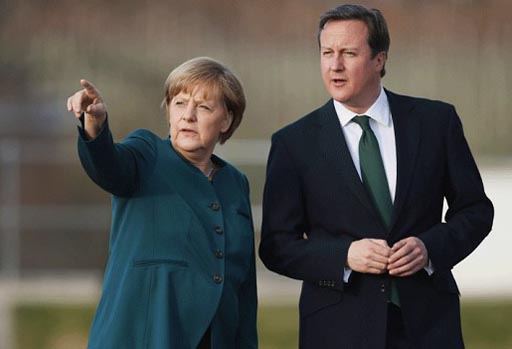That is not to say that the death of Margaret Thatcher was not an important event which demanded wide coverage, but the gross excesses of the media and their inability these days to show any restraint or sense of proportion is not a zero-sum game. News which is omitted because editors and journalists fall prey to any and every passing hystérie du jour is largely lost altogether, diminishing publish debate and weakening us as a society.
So it is with the idea of EU "reform", that tired and jaded canard let loose this weekend by David Cameron after his meeting en famille with the German chancellor.
So much have we heard of "reform" over the years that we joined the EU – whether it be CAP reform, CFP reform, or reform in general – that the very idea has long ago been discredited. Yet vacuous politicians such as David Cameron still trot it out, and the media still give it house room, as if it merited serious consideration.
The antidote, of course, is news – and intelligent analysis – news of such issues as the latest EUCourt of Auditors report on EU support to the food-processing industry, published last week.
In terms of a news event, this is by any measure, significant. The actual report argues that the bulk of the €5.6 billion spent on grants to the food processing industry over the last multi-annual period has in effect, been wasted, in failing entirely to meet the stated objectives of the fund.
One could – and the media should – offer news reports on this, seeking to highlight and explain a complex issue, and put it in context. Take the €5.6 billion, for instance, and link it to the demand for an amendment budget of €11.2 billion, which is set to cause so much political grief in the very near future. Half of that could have been saved by omitting the failed food processing programme.
But then we need not stop there. Another Court of Auditors Report looks at one tiny aspect of spending within the €75 billion European Social Fund – the schemes to assist older workers in the workplace.
Interestingly, having looked at a limited set of programmes, from a sub-set which involved €1 billion expenditure, the Court found that neither the member states nor the European Commission were in a position to establish how many older workers benefited for the fund. Furthermore, it said, the amounts spent on this kind of action are also unknown.
Going back a few more months, we find another report assessing the value of €5 billions-worth of expenditure on "cohesion policy investments in cost-effective energy efficiency".
And, in a damning conclusion, the auditors found that "the right conditions in programming and financing had not been set to enable cost-effective energy efficiency investments". Furthermore, that found that money had been paid out on schemes without identifying where energy savings could be achieved, and whether they could be could be cost-effective. In effect, said the Auditors, the chosen measures and their cost could not be justified.
Put these three reports together and you have identified just over €11 billion of waste, thereby demonstrating that, with better control of expenditure, the amendment budget would not have been needed.
And there comes the reform agenda. If only the system was reformed, say the siren voices, scandals like this could be avoided. But that is where the analysis is needed. Here, we are not talking about corruption and fraud, per se, but simply badly managed programmes.
The trouble here is that they are entirely managed by member states who process applications, check proper completion of the funded schemes and pay out the money – then reclaiming it from the EU. The Commission has neither the manpower nor the authority to gainsay the expenditure (although it can reclaim funds retrospectively) and pays out on demand.
The heart of the problem, thus, is the very nature of the system. Member states treat the funds as a way of getting money from the EU and use them to subsidise their industries and other enterprises. And, as long as there is no accountability, such a situation will continue.
Looking at this analytically, the only way the system could be improved is to give the European Commission far more power, and more staff, so that it could directly approve and supervise these schemes, taking over from the member states. But such an option would be politically untenable (even assuming that the Commission would do the job better), which means that we are doomed to suffer the existing flawed system.
Yet, none of these Court of Auditor reports have been publicised by the British media, not even the most recent, where the egregious waste of €5.6 billion is recorded. To its credit, we find reference inDWN, and in specialist websites, but the supposedly eurosceptic British media are silent.
Instead, tucked in amid the torrent of Thatcher coverage, we get the likes of this from The Independent. It tells us that, of the meeting between Cameron and Merkel, officials said the two leaders agree that the EU treaties would have to be changed, which Mr Cameron is banking on to renegotiate the UK's position in the EU.
However, we are then informed that no agreement was reached on what form the changes would take, or when they would take place. "They both agree that further changes to the treaty will be needed in the future. What and when are issues that are obviously still to be decided", the paper reports.
No wonder, on this blog at least, we are tearing our hair out at the vacuity of the debate. Getting to grips with the issues is like trying to paint fog.
COMMENT THREAD
